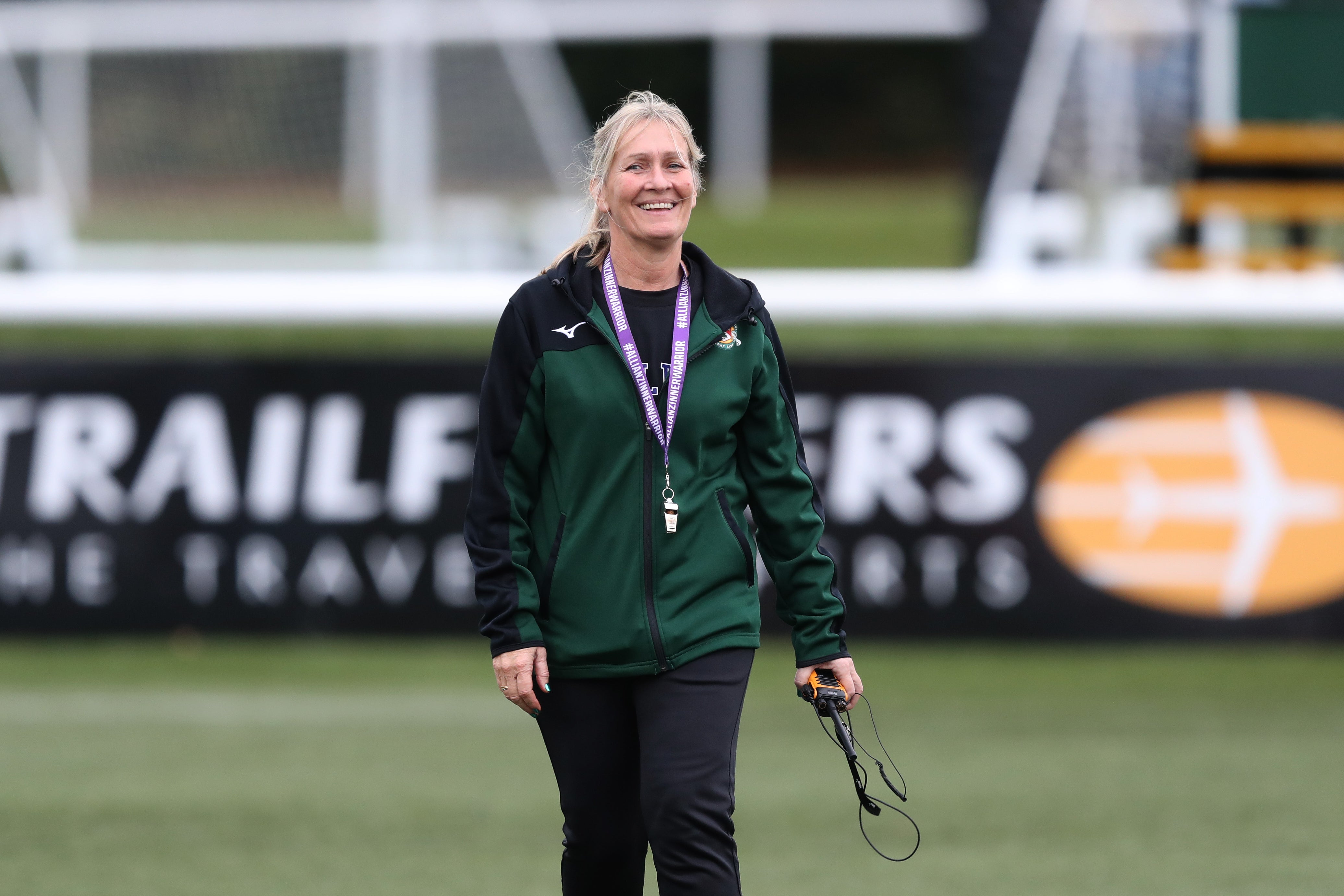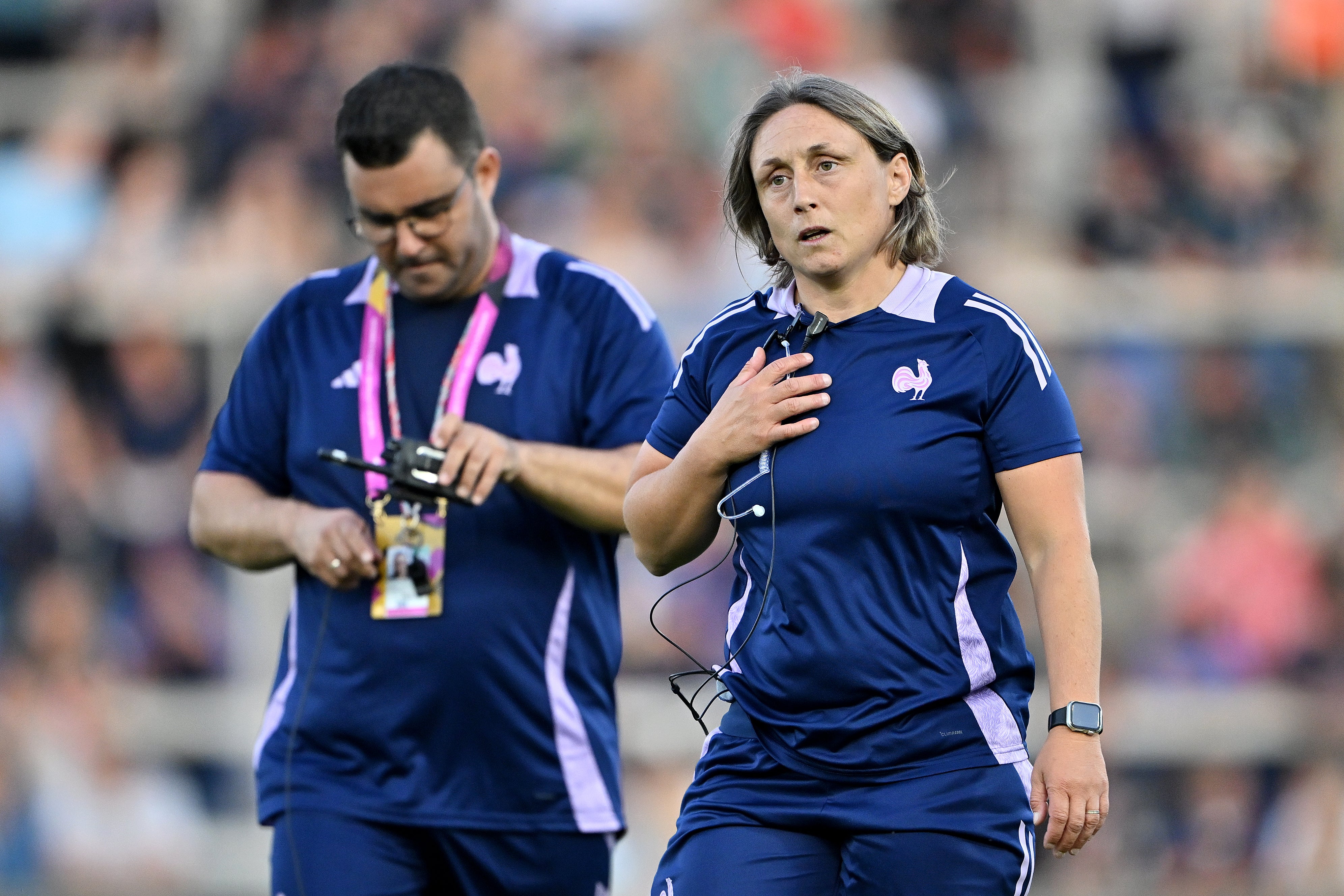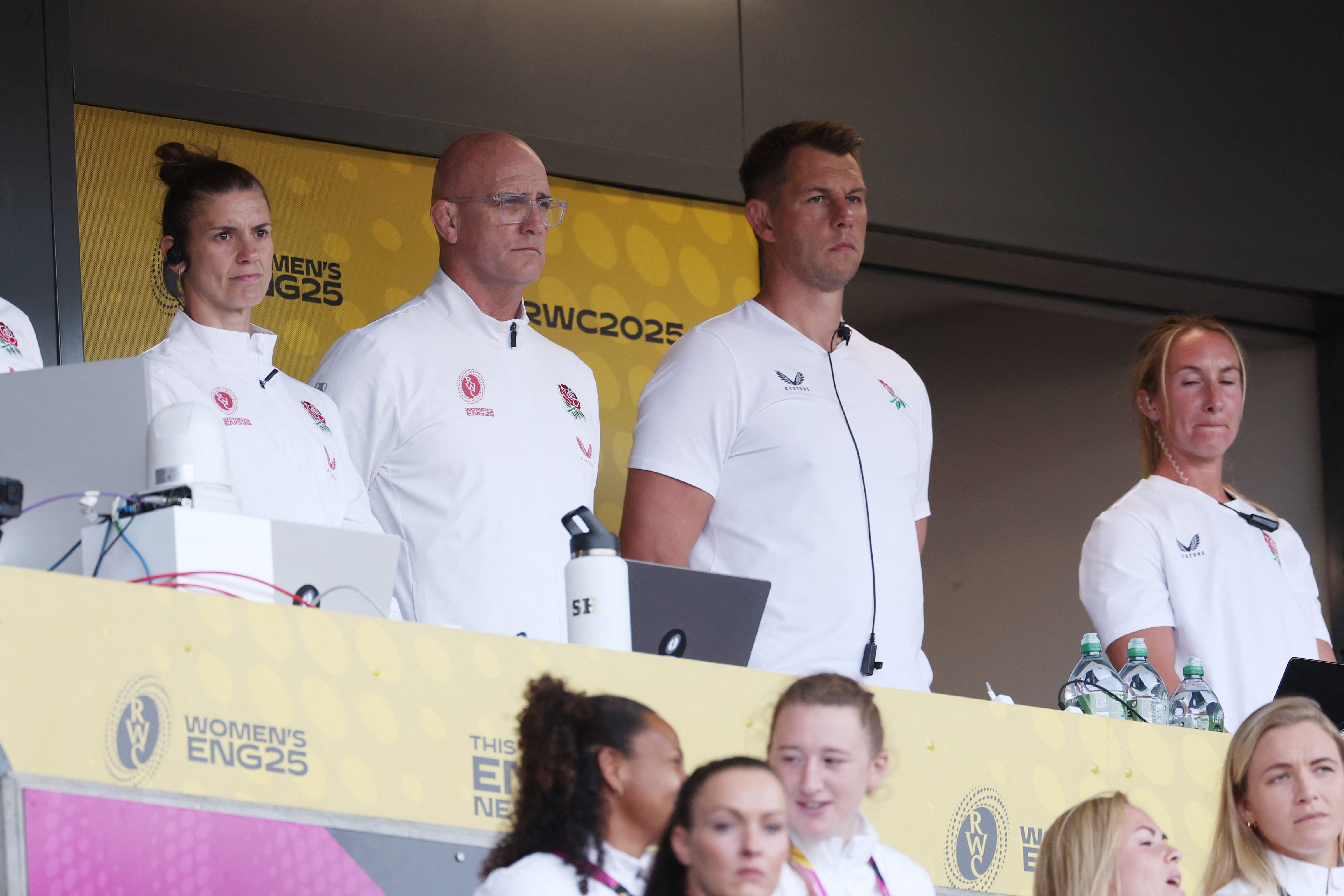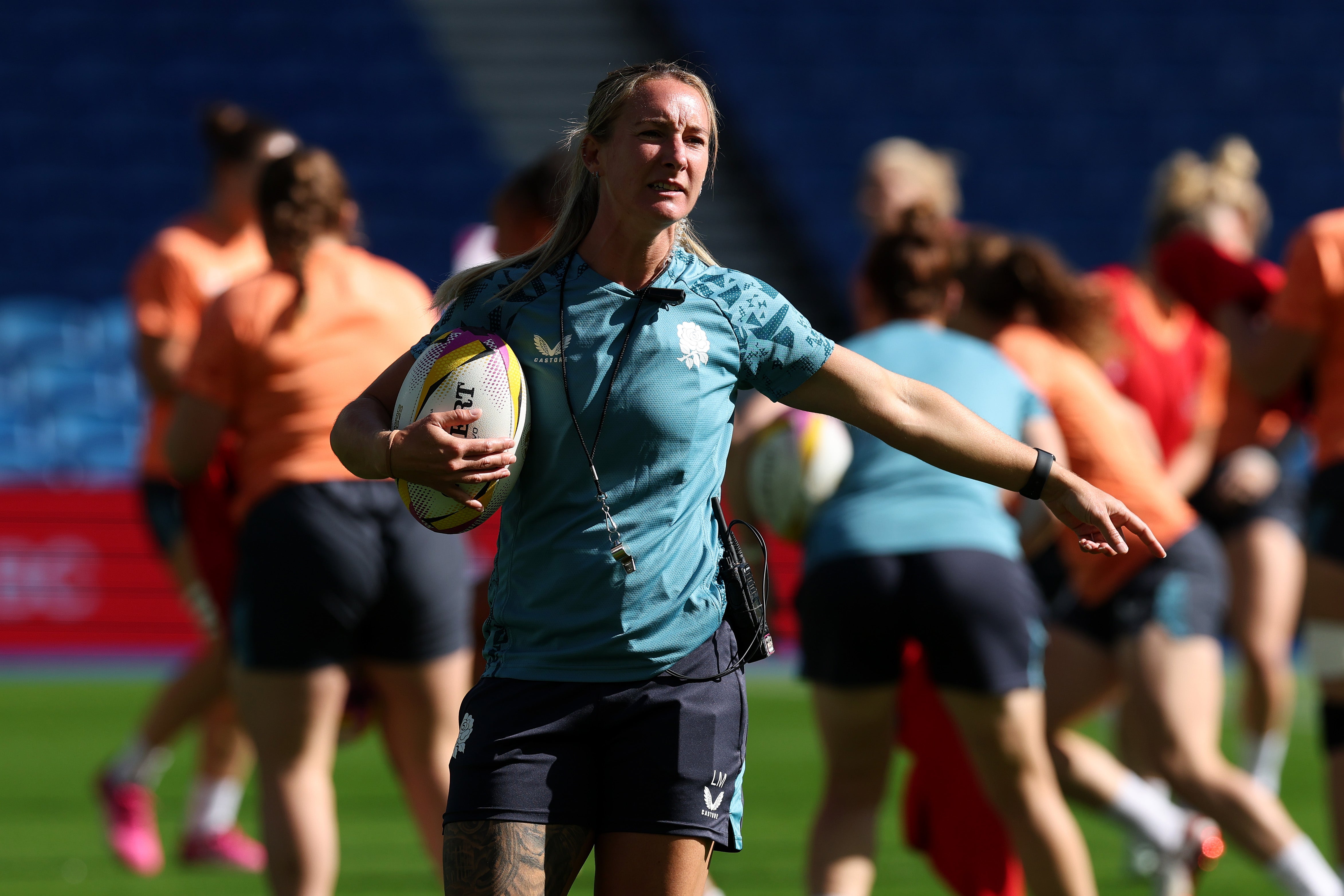A World Cup that could transform the landscape of rugby has sought to put women at its centre. While the players are at the heart of it all, each and every officiating team at this tournament has been led by a female referee, too. For the final, the grounds staff at Twickenham will be entirely comprised of women. Sarah Massey, Rugby World Cup 2025’s managing director, and Sally Horrox, World Rugby’s Chief of Women’s Rugby, have been the tournament’s figureheads and most prominent spokespeople off the pitch, while the ambition of executives including former England captain Sue Day and the influential Alex Teasdale at the Rugby Football Union (RFU) has been realised in a record-breaking event.
But there is one place in which women are not necessarily quite so central. Of the 16 head coaches in England for the tournament, only three are female – and one of those, France’s Gaelle Mignot, splits her duties with David Ortiz. In backroom teams, progress has been made with the number of female coaches overall quadrupling from six at the 2022 World Cup to 23 now – but a figure of 32 percent of coaches that are female still falls short of the 40 percent target set by World Rugby after the last tournament. With Lesley McKenzie’s Japan exiting despite a fine win over Spain, Australia’s Jo Yapp, whose coaching qualities were on full display as Australia navigated into the quarter-finals against England, is the last standalone female head coach standing.
“I do think that we should stick with the best person for the job, and it is fantastic that Jo has been the best person for this job,” Wallaroos forward Emily Chancellor says of working under the former England scrum half. “She’s offered a great humility to the role, and her human connection has been a really big part of what has made us so strong. She’s not afraid to have a harsh word with us, but away from the field she makes sure she has got that connection and is very compassionate. She is driving that good players, better people philosophy.
“We want women in the right roles, but we’ve got to create the right infrastructure around it so that women are earning that position and not just handing it out.”
But it is not just at international level where there are reasons for concern. In fact, in England’s Premiership Women’s Rugby (PWR) – widely recognised as the leading domestic league in the world – next season will begin without a single woman in a lead coaching role.
While Yapp awaits her next challenge having joined the Wallaroos following the sad demise of Worcester, also now out of PWR jobs are Susie Appleby – axed by Exeter, slightly curiously, earlier this year – and Amy Turner, moved into a different role at Harlequins at the start of last season before leaving the club entirely this summer. Former Wales captain Rachel Taylor has joined Loughborough as a backs coach after stepping down from Sale, while Giselle Mather left Trailfinders due to a “difference in philosophy” last August. Mather now faces real uncertainty having been in charge of a GB Sevens side that has gone part-time – she would add value in just about any environment.

It was only a two years ago that a PWR season started with six female head coaches across the league. While many of their replacements have been highly-regarded and already embedded in the women’s game, it is perhaps peculiar that each and every one of the nine head coaches in the league is now a man. Players understandably insist that they simply want the best person for each job. But all in the game also recognise that it is important to nourish and nurture the next generation of female coaches, too.
Providing the right sort of roles is therefore key. “We’ve got to look at the opportunities we are giving coaches to learn their trade,” Katy Daley-McLean, 2014 World Cup winning captain and now women’s performance lead at Sale, told me in February. “I don’t think having PWR be your first exposure is the right thing to do. You are under so much scrutiny and pressure.
“We’ve got to look at the coaching set-up to get coaches prepped for that. And then in the community game, you look at changing attitudes to women within rugby clubs: ‘I feel welcome in this space, and now I have the opportunity to be upskilled’. Previously, you’d go to a community rugby club and those women were serving hot dogs, or were team managers, they weren’t on the field coaching.”

As many women’s programmes deal with the transition to professionalism, some unions have understandably looked to coaches with experience of managing that change. Scott Bemand, for example, has been an undoubtedly positive appointment for Ireland after a long stint as an assistant and lead coach with England; John Mitchell and Wayne Smith, meanwhile, have proved that one does not necessarily to have worked in the women’s game before to have a significant impact.
The number of full-time, fully-paid careers in coaching in women’s rugby have been relatively minimal until the last decade. Opportunities are starting to open up within staffs both in the club game and internationally, and new. World Rugby has, with support from insurance broker Gallagher, supported 43 female coaches through its High Performance Academy, with England defence coach Sarah Hunter and Mignot among those benefitting from support. As more retiring players are given opportunities in roles as assistants, they will naturally graduate to head coaching positions domestically or internationally.

Beneath the elite, though, and as Daley-McLean suggests, work still needs to be done to bring women into and through the pathway. Pretty much every woman in sport has a story of being made to feel unwelcome or out of place, either consciously or unconsciously. Mather tells a story of figures at perplexing officials when she asked if she could bring her six-week-old daughter to her Level 3 RFU coaching course, where she was the only woman in a room of 100 male coaches.
The 1994 World Cup winner passed, and later became the first female rugby union coach to earn her Level 4 badge. Mather subsequently worked with some of the best and brightest male players in London Irish’s academy, and more women working in male professional staffs is surely another necessary step that may be on the way. Turner, now with Hampton School and Rosslyn Park, took up a position as a pathway coach in Harlequins’ men set-up last season. Red Roses attack coach Lou Meadows has also worked within the men’s game, both with England’s Counties U20 side earlier in her career and in a short stint with England A last November.

Pleasingly, there is encouraging data at the grassroots level, too. In England, the Impact ’25 legacy programme for this World Cup had already driven 1,456 newly qualified female coach and match officials at the halfway point at the start of this year. In the 2023/24 season, 20% of individuals on booked on courses were female, an 11% increase since Impact ‘25 began.
The visibility afforded female coaches at this tournament is important, too, both in developing coaching networks that benefit all and in showing the next generation that they can aspire to top roles. Key appointments may be on the way - should the Red Roses job come open again, Yapp, Mather, Meadows and Hunter would all be well qualified candidates, while the first British and Irish Lions women’s head coach to take the touring side to New Zealand will be confirmed in the next 18 months.
“Jo Yapp is a fantastic coach,” Meadows said last week ahead of England’s encounter with Australia. “When I was the under-20s coach, she was at Worcester so she was coaching there and she's always been extremely supportive – as soon as I started coming through as a female coach, she actually reached out a number of times. I love how she goes about the empathy side to it. I think she could use that in any space she worked in; I think she could cross into the men's game and do exactly the same.
“I think that the fact that she's female and has got to that position is brilliant because it shows that there is a pathway and there is way for women to get into those positions. For her to be doing it on the top stage, at a home World Cup where myself and Sarah [Hunter] as female coaches are also exposed on that stage, just shows even more women the opportunities that they can get into.

“Beyond coaching as well, we've got a massive background of staff from physios to nutritionists to strength and conditioning coaches. The more we can push to those top-level positions, and be working on the international stage, I think the more doors that will open for other females to do exactly the same.”
Women’s Rugby World Cup 2025 fixtures: Full schedule, results and kick-off times
Imperfect New Zealand shut out Ireland to show champion qualities at Women’s World Cup
Who and when do England play next? Red Roses’ route to 2025 Women’s World Cup final
Women’s Rugby World Cup 2025 fixtures: Full schedule, results and kick-off times
Imperfect New Zealand shut out Ireland to show champion qualities







